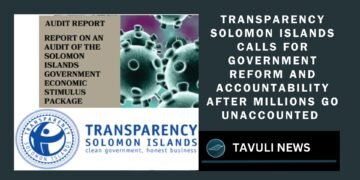Secretary Raomae outlines urgent measures to address revenue discrepancies in forestry sector monitoring and compliance checks
The Ministry of Forestry and Research has commenced its 100-day agenda under the Government for National Unity and Transformation (GNUT), focusing initially on improving log export monitoring and compliance checks.
In a statement, Forestry Secretary Richard Raomae acknowledged the longstanding priority of monitoring log exports and compliance. He attributed setbacks to budget reductions and inadequate incentives, hindering effective operations.
“Likewise, it is my personal agenda since been in the forestry sector for the past decades, this is no new issue and upon taking up the role as Permanent Secretary it
is a key priority focus for me “I believe that the country is losing millions of dollars in revenue both to the SIG in terms of export duty and the resource owners in terms of royalties from the lack of proper monitoring, carrying out of quality control and log export checks”.
Raomae praised the GNUT government for prioritizing these issues in its 100-day program, aiming to maximize revenue from forestry resources.
Key activities under the initiative include 10% volume checks during log scaling, 100% inspections during loading to ensure consistency, and species verification for accurate valuation.
Raomae stressed the importance of maintaining these procedures with frequent field audits in active concessions to mitigate revenue loss. He noted a lapse in effective monitoring since 2009 following the conclusion of an AusAid-funded program supporting forestry management.
“This is what the ministry should be doing for the past 10 or so years to ensure that revenue generated from the forestry sector reflects the true value of our logs export and revenue beneficiaries both SIG and resource owners; so maximum benefit is received from the forest resources accordingly,” he adds.
Looking ahead, Raomae called for sustained efforts beyond the initial 100 days, advocating for increased budgetary support, timely provision of logistical components, and reinstatement of overtime incentives for field officers.
“These steps are crucial to reducing potential revenue leakages in the forestry sector,” Raomae asserted.
In addition to the monitoring drive, the ministry progresses on legislative priorities such as the Forestry Bill 2024, aimed at sustainable management of the country’s forest resources.
Source: MOFR


















































































